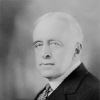Irving Babbitt

Irving Babbitt
Irving Babbittwas an American academic and literary critic, noted for his founding role in a movement that became known as the New Humanism, a significant influence on literary discussion and conservative thought in the period between 1910 and 1930. He was a cultural critic in the tradition of Matthew Arnold and a consistent opponent of romanticism, as represented by the writings of Jean-Jacques Rousseau. Politically he can, without serious distortion, be called a follower of Aristotle and Edmund Burke. He...
NationalityAmerican
ProfessionCritic
Date of Birth2 August 1865
CountryUnited States of America
This comparative indifference to clearness and consistency of thought is visible even in that chief object of our national concern, education.
One should, therefore, in the interests of democracy itself seek to substitute the doctrine of the right man for the doctrine of the rights of man.
One of our federal judges said, not long ago, that what the American people need is ten per cent of thought and ninety per cent of action.
Democracy is now going forth on a crusade against imperialism.
To say that most of us today are purely expansive is only another way of saying that most of us continue to be more concerned with the quantity than with the quality of our democracy.
To harmonize the One with the Many, this is indeed a difficult adjustment, perhaps the most difficult of all, and so important, withal, that nations have perished from their failure to achieve it.
We may affirm, then, that the main drift of the later Renaissance was away from a humanism that favored a free expansion toward a humanism that was in the highest degree disciplinary and selective.
If a man went simply by what he saw, he might be tempted to affirm that the essence of democracy is melodrama.
If quantitatively the American achievement is impressive, qualitatively it is somewhat less satisfying.
Robespierre, however, was not the type of leader finally destined to emerge from the Revolution.
Inasmuch as society cannot go on without discipline of some kind, men were constrained, in the absence of any other form of discipline, to turn to discipline of the military type.
The true humanist maintains a just balance between sympathy and selection.
A democracy, the realistic observer is forced to conclude, is likely to be idealistic in its feelings about itself, but imperialistic about its practice.
The democratic idealist is prone to make light of the whole question of standards and leadership because of his unbounded faith in the plain people.